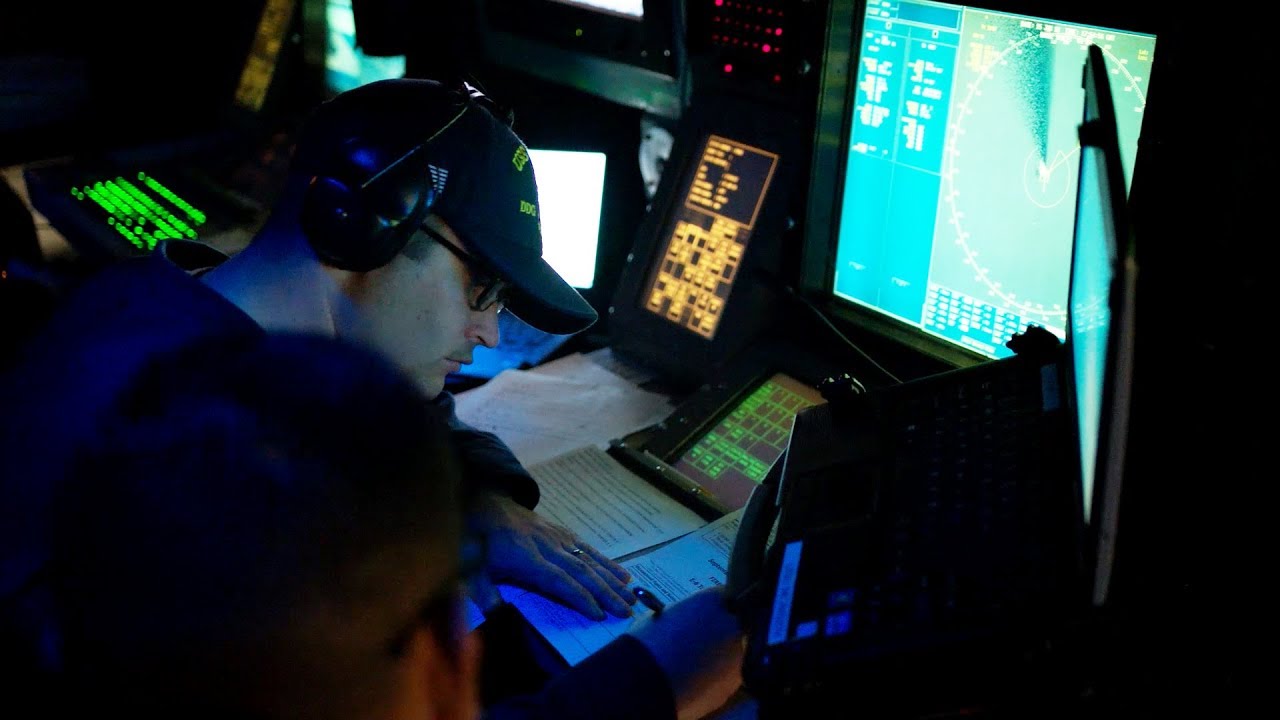What to Expect
More Information
Responsibilities
Operations Specialists function as plotters, radio-telephone and Command and Control sound-powered telephone talkers and maintain Combat Information Center (CIC) displays of strategic and tactical information. On any given day, Operations Specialists:
- Serve as watch supervisors and section leaders
- Track, classify and evaluate potential contacts using the latest radar equipment
- Interpret and evaluate presentations and tactical situations and make recommendations to supervisors during watch conditions
- Apply a thorough knowledge of doctrine and procedures applicable to CIC operations contained in U.S. Navy Instructions and Allied or U.S. Navy
- Provide to the command technical information and assistance related to Anti-Surface Warfare, Anti-Air Warfare, Anti-Submarine Warfare, Amphibious Warfare, Mine Warfare, Naval Gunfire Support, search and rescue operations and other matters pertaining to the Operations Specialist's area
Work Environment
As an Operations Specialist, your work environment will be fairly comfortable, often indoors in a clean computer room environment. This role involves mostly mental work. And most OSs work closely as a team with bridge watch-standers and navigation teams rather than individually.
Training & Advancement
Upon completion of initial training at Recruit Training Command Great Lakes, (known as Boot Camp), those pursuing an Operations Specialist role report to Class “A” Technical School in Great Lakes, IL, for 10 weeks. Here, they develop a working knowledge of tactical publications, charts and course plotting, radar operation, detection, tracking and interpretation, air and surface status board keeping, radio-telephone coding, anti-warfare, plotting, vector analysis and Naval tactical data systems.
Once you’ve finished schooling, you’ll spend the rest of your career alternating between service at shore commands and aboard surface ships in the U.S. and overseas.
Promotion opportunities are regularly available but competitive and based on performance. It’s also important to note that specialized training received and work experience gained in the course of service can lead to valuable credentialing and occupational opportunities in related fields in the civilian sector.
Education Opportunities
Beyond offering access to professional credentials and certifications, Navy technical and operational training for an Operations Specialist can translate to credit hours toward a bachelor’s or associate degree through the American Council on Education.
You may also continue your education through undergraduate degree opportunities like the Navy College Program and Tuition Assistance and the Post-9/11 GI Bill.
Qualifications & Requirements
A high-school diploma or equivalent is required to become an Enlisted Sailor and Operations Specialist in the Navy. Operations Specialists must be U.S. citizens and be able to meet all security clearance requirements. A good working knowledge of arithmetic, the capability for understanding modern computing devices, the ability to speak and write well and function as a member of an integrated team, do detailed work and keep accurate records, some physical strength and good manual dexterity are necessary.
General qualifications may vary depending upon whether you’re currently serving, whether you’ve served before or whether you’ve never served before.
Part-Time Opportunities
There are part-time opportunities available as an Operations Specialist.
Serving part-time as a Navy Reserve Sailor, your duties will be carried out during your scheduled drilling and training periods. During monthly drilling, Operations Specialists in the Navy Reserve typically work at a location close to their homes.
For annual training, Operations Specialists may serve anywhere in the world, whether on a ship at sea or at bases and installations on shore.
Take a moment to learn more about the general roles and responsibilities of Navy Reserve Sailors.
Most of what you do in the Navy Reserve is considered training. The basic Navy Reserve commitment involves training a minimum of one weekend a month (referred to as drilling) and two weeks a year (referred to as Annual Training) – or the equivalent of that.
Operations Specialists in the Navy Reserve serve in an Enlisted role. Before receiving the ongoing professional training that comes with the job, initial training requirements must be met.
For current or former military Enlisted servicemembers, prior experience satisfies the initial Recruit Training requirement, so you will not need to go through Boot Camp again.
For those without prior military experience: you will need to meet the initial Recruit Training requirement by attending Boot Camp in Great Lakes, IL. This training course will prepare you for service in the Navy Reserve and count as your first Annual Training.

